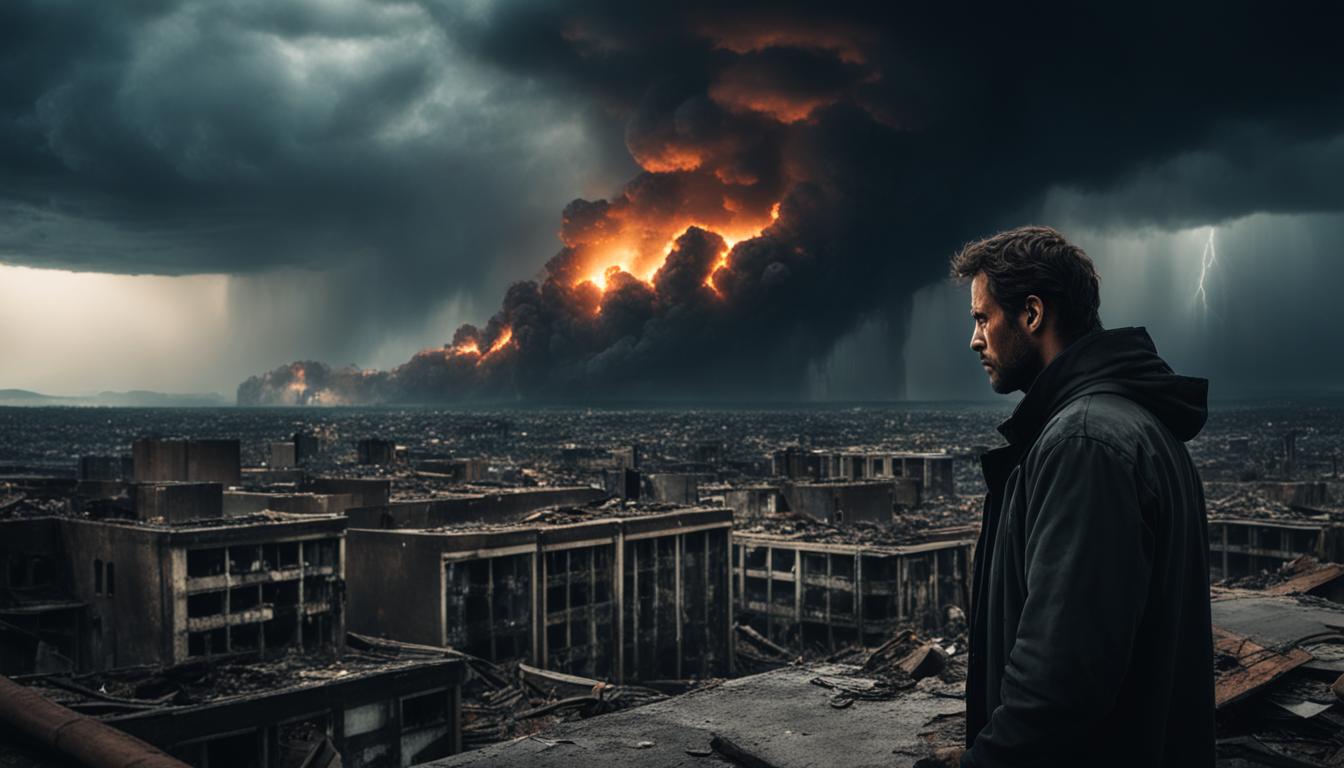Stephen King is renowned for his mastery of horror and gripping narratives that leave readers on the edge of their seats. His apocalyptic vision, in particular, has left an indelible mark on the literary world, inspiring countless authors and filmmakers to explore the darker aspects of the human psyche.
In this ultimate guide, we take a deep dive into Stephen King’s apocalyptic works, examining the themes, characters, and impact of his writing on the genre at large. Whether you’re a die-hard fan or new to King’s work, this guide is sure to offer insights into one of the most influential authors of our time.
Key Takeaways
- Stephen King is a master of horror and apocalyptic storytelling.
- His apocalyptic vision has influenced countless authors and filmmakers.
- This ultimate guide offers a comprehensive look at King’s apocalyptic works.
- Explore the themes, characters, and impact of King’s apocalyptic narratives.
- Gain insights into King’s writing process and the legacy he has left on the genre.
The Origins of Stephen King’s Apocalyptic Themes
Stephen King’s fascination with apocalyptic themes dates back to his childhood. Growing up in a tumultuous era of political strife, Cold War tensions, and looming threats of nuclear war, King developed a deep-seated fear of the end of the world.
As King honed his craft as a writer, he began channeling his fears into his stories, crafting apocalyptic narratives that captured the collective anxieties of his readers. In works like “The Stand” and “Cell,” King explores the devastating aftermath of catastrophic events, depicting the breakdown of society and the struggle for survival amidst chaos.
King’s use of apocalyptic themes also serves as a vehicle for exploring deeper philosophical questions about the human condition. Through his writing, he examines the nature of good and evil, the limits of human resilience, and the possibility of redemption in the face of overwhelming adversity.
Despite the grim subject matter of his apocalyptic fiction, King’s narratives are ultimately grounded in hope and a belief in the resilience of the human spirit. This enduring optimism has made his works some of the most beloved and enduring in the apocalyptic fiction genre.
Notable Apocalyptic Novels by Stephen King
Stephen King’s apocalyptic novels have captivated readers for decades, with their compelling characters, gripping narratives, and thought-provoking themes. Here are some of his most notable works in the genre:
The Stand
First published in 1978, “The Stand” is one of King’s most iconic apocalyptic novels. The book follows a group of survivors of a deadly virus that has wiped out most of the world’s population, as they navigate a post-apocalyptic landscape filled with danger and desperation. “The Stand” has been adapted into multiple formats, including a popular miniseries and graphic novel.
Cell
“Cell,” published in 2006, takes a unique approach to the apocalyptic genre, imagining a scenario in which a mysterious signal transmitted through cell phones turns most of the world’s population into mindless, violent zombies. The novel explores themes of technology, isolation, and the loss of human connection. In 2016, “Cell” was adapted into a film starring John Cusack and Samuel L. Jackson.
The Institute
Released in 2019, “The Institute” centers around a group of children with extraordinary abilities who are held captive in a shadowy government facility. When a young boy named Luke escapes, he must navigate a world he never knew existed and confront evil forces that threaten his very existence. “The Institute” blends elements of science fiction and the supernatural, creating a chilling and thought-provoking story.
Stephen King’s apocalyptic novels have influenced countless other writers and filmmakers, shaping the way we imagine the end of the world. Their impact on the genre will be felt for years to come.
The Themes and Motifs in Stephen King’s Apocalyptic Fiction
Stephen King’s apocalyptic fiction is filled with recurring themes and motifs that have become hallmarks of his unique storytelling style. One prevalent theme is the battle between good and evil, often depicted through characters who are faced with difficult choices and moral dilemmas. Another theme is the breakdown of societal norms and the subsequent rise of chaos, as seen in novels such as “The Stand” and “Cell.”
Motifs such as isolation and survival are also frequently explored in King’s apocalyptic works. Characters are often forced to confront their deepest fears and find strength within themselves to overcome seemingly insurmountable obstacles. These themes and motifs serve to create a sense of tension and urgency, and to keep readers engaged and invested in the story.
King’s use of horror elements in his apocalyptic fiction also adds to the tension and atmosphere, as he masterfully blends the two genres to create gripping narratives that are both terrifying and thought-provoking. From the supernatural horrors in “The Stand” to the psychological horrors of “The Mist,” King’s ability to weave together multiple themes and motifs results in stories that are rich, complex, and unforgettable.

The Battle between Good and Evil
The struggle between good and evil is a recurring theme in Stephen King’s apocalyptic fiction. In “The Stand,” readers are introduced to two opposing sides, one led by the benevolent Mother Abigail and another by the malevolent Randall Flagg. Each character represents opposing values, and the battle between them becomes a reflection of the human condition and the choices we make in times of crisis.
In “Cell,” the battle is between the “phoners” (people who have been converted into violent zombies by a mysterious cell phone signal) and a small group of survivors led by the protagonist, Clayton Riddell. The novel explores the moral dilemma of whether to fight or submit to the chaos, and the consequences of each choice.
The Breakdown of Societal Norms
The breakdown of societal norms is another prevalent theme in King’s apocalyptic fiction, particularly in “The Stand” and “Cell.” In both novels, the collapse of civilization leads to the rise of violence and chaos, with the characters struggling to adapt and survive in this new world.
The breakdown of communication is also explored in “Cell,” where the loss of technology leaves the characters isolated and unable to connect with each other or the outside world. This motif is further emphasized by King’s use of horror elements, as the characters face not only physical danger, but also psychological terrors born from their isolation.
Isolation and Survival
Isolation and survival are common motifs in King’s apocalyptic fiction, as characters are forced to confront their deepest fears and find strength within themselves to survive. In “The Mist,” a group of characters is trapped in a supermarket as a mysterious mist engulfs the town, unleashing a host of terrifying creatures. As they struggle to survive, they must also confront their own inner demons and the idea that their fate is ultimately in their own hands.
Similarly, in “The Stand,” survivors must navigate a world that has been decimated by a deadly virus, facing not only the physical challenges of survival, but also the emotional toll of losing loved ones and struggling to find meaning in a world that has been forever changed.
Overall, Stephen King’s apocalyptic fiction is marked by its thought-provoking themes and motifs, its masterful use of horror elements, and its ability to create rich and unforgettable stories that resonate long after the last page has been turned.
Psychological and Societal Impact in Stephen King’s Apocalyptic Works
Stephen King’s apocalyptic works have left an impression on readers and society at large. His stories often explore the darkest corners of the human psyche and the societal implications of catastrophic events.
King’s portrayal of the psychological impact of apocalypse on his characters is hauntingly realistic. Through his depictions of survivors struggling with trauma, fear, and loss of humanity, King reflects the human condition and our collective fears of societal collapse.
Moreover, King’s apocalyptic works tackle societal issues such as power dynamics, religious extremism, and government incompetence. By weaving these elements into his narratives, King highlights the disastrous consequences of societal breakdown and the impact on individual lives.
Overall, Stephen King’s apocalyptic works are a reflection of the human condition, our deepest fears, and the societal issues that plague us. Through his powerful storytelling and impactful characters, King creates a thought-provoking and unforgettable experience for readers.
Stephen King’s Apocalyptic Characters: Heroes and Villains
Stephen King’s apocalyptic narratives feature a variety of characters, including heroes and villains, who are complex and compelling. His ability to create well-rounded characters who are flawed and relatable is a hallmark of his storytelling.
In characters like Stu Redman from “The Stand,” King creates a hero who is not invincible but rather an ordinary person thrust into extraordinary circumstances. The villains in King’s apocalyptic worlds, such as Randall Flagg, have depth and complexity that make them more than just one-dimensional antagonists.
King also plays with the idea of morality in his apocalyptic fiction. The line between hero and villain is often blurred, and characters may switch roles or challenge the reader’s perceptions. This moral ambiguity adds depth to the characters and makes them more interesting.
Overall, Stephen King’s apocalyptic characters are a testament to his ability to create compelling and multi-dimensional individuals in the midst of catastrophic events.
Adaptations of Stephen King’s Apocalyptic Stories in Film and Television
Stephen King’s gripping apocalyptic narratives have been the subject of numerous adaptations in both film and television. These adaptations have captivated audiences and brought King’s work to a wider audience.
Film Adaptations
King’s novels have been adapted into successful feature films, including “The Stand” (1994) and “The Mist” (2007). These adaptations showcase the bleak post-apocalyptic world that King masterfully creates in his writing, and the emotional depth of his characters.

Television Adaptations
King’s work has also been adapted into television series, including the recent adaptation of “The Stand” (2020). These adaptations allow for a more in-depth exploration of King’s complex apocalyptic themes and the development of his memorable characters.
Overall, the adaptations of King’s apocalyptic stories in both film and television have successfully captured the essence of his work and solidified his place as a master of the genre.
Stephen King’s Writing Process for Apocalyptic Narratives
Stephen King’s approach to the writing process for his apocalyptic narratives is a fascinating combination of meticulous planning and improvisation. He has stated that his inspiration can come from anything, including personal experiences, news headlines, and even dreams.
Once he has an idea, he will often spend a significant amount of time researching and outlining the story. This includes developing the characters, themes, and setting, as well as determining the overall plot and structure.
However, King also emphasizes the importance of allowing the story to evolve naturally, and he is not afraid to deviate from his original plans if he feels the narrative requires it. As he once said, “I never have a plan…I wait for the characters to tell me what’s going to happen.”
King is also known for his writing discipline, often setting daily word count goals and writing for several hours each day. He is committed to his craft and takes it very seriously, stating that “writing isn’t about making money…it’s about enriching the lives of those who will read your work.”
Overall, Stephen King’s writing process for his apocalyptic narratives is a unique combination of planning, improvisation, and dedication to the craft. It is no wonder that his work continues to captivate readers around the world.
The Influence of Stephen King on the Apocalyptic Genre
Stephen King’s impact on the apocalyptic genre is undeniable. His masterful storytelling and ability to craft gripping narratives have inspired countless authors and filmmakers to explore the genre. King’s unique blend of horror, science fiction, and fantasy has set a standard for the apocalyptic genre that few have been able to match.
King’s apocalyptic works, such as “The Stand” and “Cell,” have transcended the genre and become cultural touchstones. His exploration of the human condition and collective fears through the lens of an apocalyptic vision has influenced a generation of writers and filmmakers who seek to follow in his footsteps.
From his early works to his latest novels, Stephen King has remained a trailblazer in the apocalyptic genre. His influence can be seen in the works of other esteemed authors such as Cormac McCarthy and Margaret Atwood, who continue to build upon the foundation he has laid. The impact of Stephen King’s storytelling techniques on the apocalyptic genre cannot be overstated, and his legacy will continue to shape the genre for years to come.
Stephen King’s Apocalyptic Legacy and Future Works
Stephen King’s influence on the apocalyptic genre is undeniable, with his gripping narratives and unique storytelling style captivating readers for decades. As the master of horror, King has left an indelible legacy in the genre, shaping it into what it is today.
Looking ahead, fans can anticipate King’s future works with great excitement. While he has explored apocalyptic themes in various novels, there is always something fresh and exciting about his upcoming projects. With his unparalleled imagination, King continues to push the boundaries of the genre and redefine what it means to write apocalyptic fiction.
Whether it’s a new novel or an adaptation of one of his classic works, Stephen King’s future works are sure to captivate readers and leave them on the edge of their seats. His legacy in the apocalyptic genre is secure, and his influence will continue to inspire future generations of writers and filmmakers for years to come.
FAQ
What is Stephen King’s Apocalipsis – Ultimate Guide?
Stephen King’s Apocalipsis – Ultimate Guide is a comprehensive resource that delves into Stephen King’s apocalyptic vision and explores his mastery of horror through his gripping narratives.
What are the origins of Stephen King’s apocalyptic themes?
Stephen King’s fascination with apocalyptic themes can be traced back to his childhood experiences and personal fears. These themes have greatly influenced his storytelling and are a recurring element in many of his works.
Which are some notable apocalyptic novels by Stephen King?
Some notable apocalyptic novels by Stephen King include “The Stand,” “Cell,” and “The Institute.” These novels showcase King’s skill in depicting the end of the world and the survival struggles of his characters.
What are the recurring themes and motifs in Stephen King’s apocalyptic fiction?
Stephen King’s apocalyptic fiction often explores themes such as the resilience of humanity, the collapse of societal structures, and the fight between good and evil. Motifs like isolation, supernatural forces, and the loss of innocence are also commonly found in his works.
How do Stephen King’s apocalyptic works portray psychological and societal impact?
Stephen King’s apocalyptic works delve into the psychological and societal impacts of an apocalypse. They depict the breakdown of societal norms, the unraveling of human psychology under extreme circumstances, and the exploration of collective fears and anxieties.
Who are some memorable heroes and villains in Stephen King’s apocalyptic narratives?
Stephen King has created memorable heroes and villains in his apocalyptic narratives. Examples include characters like Stu Redman from “The Stand” and Randall Flagg, who appears as a villain in multiple works. These characters are complex and multi-dimensional, adding depth to the stories.
Which film and television adaptations of Stephen King’s apocalyptic stories are noteworthy?
Noteworthy film and television adaptations of Stephen King’s apocalyptic stories include “The Stand” and “The Mist.” These adaptations successfully capture the essence of his work and bring his apocalyptic visions to life on the screen.
What is Stephen King’s writing process for crafting apocalyptic narratives?
Stephen King’s writing process for apocalyptic narratives involves meticulous planning, extensive research, and a deep understanding of human nature. He draws inspiration from various sources and employs his unique storytelling techniques to create compelling apocalyptic worlds.
How has Stephen King influenced the apocalyptic genre?
Stephen King’s influence on the apocalyptic genre is profound. His innovative storytelling techniques and realistic depictions of the human condition have inspired countless authors and filmmakers, shaping the way apocalyptic stories are told.
What is Stephen King’s apocalyptic legacy and can we expect future works from him in this genre?
Stephen King’s apocalyptic legacy is enduring, and his contributions to the genre are unparalleled. As a prolific writer, there is always the possibility of future apocalyptic works from him, captivating readers with his unparalleled imagination and storytelling skills.



